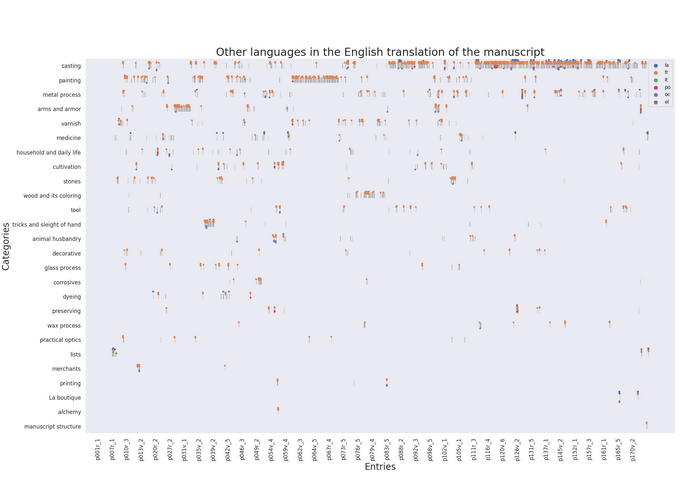Digital Making & Knowing
Digital Making and Knowing
The Making and Knowing Project has developed open access digital resources, including a publication tool for making your own edition, model projects for using the data of Secrets of Craft and Nature, digital literacy tools, syllabi, and ideas for student activities.
The markup of Ms. Fr. 640 in Secrets of Craft and Nature enables many kinds of exploration and historical insights. For an introduction, see Understanding and Analyzing the Categories of the Entries in BnF Ms. Fr. 640 by Naomi Rosenkranz.
Read a reflection on using the data of Secrets of Craft and Nature: A Computational Approach to Ms. Fr. 640 by Clément Godbarge. See also Clément’s blog: Visualizing Semantic Markup in BnF Ms. Fr. 640.

The Making and Knowing Project Sandbox
The Sandbox makes available a number of projects that utilize and explore the data underlying Secrets of Craft and Nature. The Sandbox presents experimental, provisional, and in-progress work that engages with and analyzes the data, topics, and content of Secrets of Craft and Nature, as well as the larger themes explored by the Making and Knowing Project.
The Sandbox is an online environment for students, scholars, and others to explore and experiment with the Project’s data using a variety of digital tools, where others can add and create their own tools, case studies, and add to the resources presented here. This is also a space for sharing teaching resources, exploring methods and processes across disciplines and levels of expertise, and engaging in knowledge exchange wherever possible.
View the Sandbox Repository on Github
EditionCrafter
An open source and customizable publishing tool, EditionCrafter allows users to easily publish digital editions as feature-rich and sustainable static sites, based on the feature set of Secrets of Craft and Nature.
EditionCrafter was developed as a collaboration between the Making and Knowing Project and Performant Software Solutions to address the need for a scholarly publication tool that integrates primary sources, commentary, and textual analysis. As a publication tool, EditionCrafter facilitates the dissemination of original research through the creation of a digital editions. Researchers, students, and institutions such as libraries, historical societies, archives, and community groups can grant public access to valuable textual sources across disciplines.
A platform for collaborative research and for pedagogy, EditionCrafter provides space for critical engagement with texts. Scholars and students alike can use digital tools to share not only data and finished products, but also documentation of the process of textual engagement and analysis.
Editions are published through well-established technologies and workflows and can be maintained with minimal costs and resources, helping to address issues of sustainability and longevity.
Data Management Plan
M&K’s Data Management Plan has guided all digital publications and project management areas.
Assessment and Evaluation Tools
Tools for assessing digital literacy, developed in collaboration with Columbia University’s Center for Teaching and Learning.
- The Digital Literacy Competency Calculator (DLCC), a web-based tool for representing the connection between digital literacy competencies and the teaching and learning practices that produce them. This tool was developed in collaboration with Columbia’s Center for Teaching and Learning as part of the course offering, [Spring 2017: What is a Book in the 21st Century? Working with Historical Texts in a Digital Environment.
Making and Knowing Digital Courses and Collaborations
Making and Knowing Project Digital Humanities Courses
See Making and Knowing Syllabi for details about the courses What is a Book in the 21st Century? Working with Historical Texts in a Digital Environment and Transforming Texts: Textual Analysis, Literary Modeling, and Visualization.
Minimal Computing and the Making and Knowing Project
The Making and Knowing Project worked with Alex Gil and Terry Catapano to employ the website publication tool Ed, based on minimal computing principles, to prototype the edition of Ms. Fr. 640, Secrets of Craft and Nature. In 2017, students in the Making and Knowing Project course What is a Book in the 21st Century? Working with Historical Texts in a Digital Environment created a minimal digital edition of the working English translation of BnF Ms. Fr. 640. In this minimal edition, they chose to organize the text not by folios, but by entry header titles, thus interrogating the relevance of the codex format for a digital environment. A full conventional organization by folios of the transcriptions and English translation of Ms. Fr. 640 was later developed as an Ed Edition, with a rudimentary visualization of the manuscript’s encoding that had been undertaken by the Making and Knowing paleographers (click the menu at upper left). This visualization was developed further as the List of Entries in Secrets of Craft and Nature.
Ms. Fr. 640 in Virtual and Augmented Reality
The Columbia University Computer Graphics and User Interfaces Lab (CGUI), led by Professor Steven Feiner, developed an augmented reality (AR) toolset to complement Secrets of Craft and Nature. These interactive tools help communicate the practice-based experiential knowledge generated in the Making and Knowing lab, allowing readers to experience the process of historical techniques through cutting-edge visualization technologies, including Microsoft HoloLens and Google Tango devices.
CGUI Research Assistant Samantha Siu developed a mobile app that allows users to add impromptu notes, take video, and capture photos while viewing items or undertaking an experiment in the Project laboratory. For their final project in Transforming Texts, a student group collaborated with Samantha to test her application and develop a test database in which the entire process of following a recipe and the corresponding user’s annotation at each step is readily available.
Explore the AR tools developed by the students